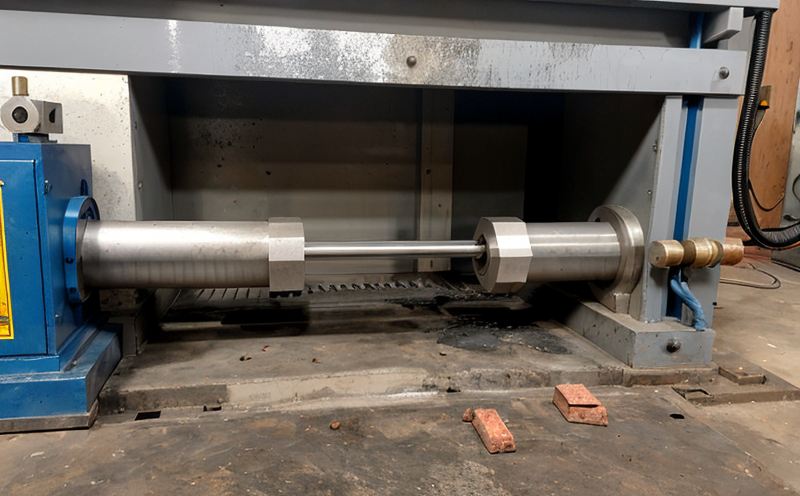ASTM E646 N-Value Tensile Testing
The ASTM E646 standard specifies a method for determining the N-value, which is an indicator of the material's resistance to non-proportional loading in tension. This test is particularly useful for understanding the behavior of materials under complex stress conditions, such as those encountered during welding or other manufacturing processes.
The N-value is determined by applying a specified tensile load to a specimen and observing the point at which the material transitions from elastic deformation to plastic flow without undergoing an actual fracture. This transition point indicates the onset of non-proportional loading, which can be critical for ensuring that materials meet specific performance requirements.
The test is conducted using specialized equipment, including a tensile testing machine equipped with a strain rate capability. The specimen used in this test must comply with the dimensions and geometric features specified by ASTM E646. Proper preparation of the sample ensures accurate results and compliance with the standard.
Once the test is completed, the data obtained are analyzed to determine the N-value. This value provides important information about the material's behavior under stress and can be used in conjunction with other mechanical properties testing to ensure that materials meet their intended design specifications.
For quality managers and compliance officers, understanding the ASTM E646 N-value tensile test is crucial for ensuring that products meet safety and performance standards. R&D engineers rely on this test to refine material formulations and processes, while procurement professionals use it to select materials that will perform reliably in their intended applications.
The ASTM E646 standard is widely recognized and utilized in industries where material performance under complex loading conditions is critical. Compliance with this standard ensures that products meet the highest quality and safety standards, which is essential for maintaining a competitive edge in the market.
Environmental and Sustainability Contributions
The ASTM E646 N-value tensile test plays a vital role in promoting environmental sustainability by helping manufacturers select materials that are both robust and sustainable. By ensuring that materials meet the highest quality standards, this test supports the development of products with extended lifecycles, reducing waste and resource consumption.
Understanding how materials behave under stress is essential for designing more efficient manufacturing processes. This knowledge can lead to reduced energy consumption, lower emissions, and minimized environmental impact throughout the product lifecycle. Additionally, by ensuring that materials perform reliably in their intended applications, this test helps prevent premature failure and subsequent replacements, further enhancing sustainability.
The ASTM E646 standard is an integral part of a broader effort to promote sustainable practices across various industries. By adhering to these standards, manufacturers can contribute to the development of more resilient and environmentally friendly products. This not only benefits the environment but also enhances consumer confidence in the quality and reliability of products.
The test's focus on non-proportional loading is particularly relevant in industries where materials are subjected to complex stress conditions. By providing accurate data on material behavior under these conditions, this test helps manufacturers design products that can withstand harsh environments and extended use. This contributes to the development of more durable and sustainable products.
Use Cases and Application Examples
The ASTM E646 N-value tensile test is widely used in industries where material performance under complex loading conditions is critical. Some key use cases include:
- Aerospace Industry: Ensuring that materials used in aircraft construction can withstand the stresses of flight.
- Automotive Industry: Developing vehicle components that are both strong and lightweight, enhancing fuel efficiency and safety.
- Building and Construction: Selecting materials for structural applications that must endure environmental stressors like temperature changes and humidity.
- Machinery Manufacturing: Designing parts that can operate under high stress without failure.
In each of these industries, the ASTM E646 N-value tensile test is used to ensure that materials meet specific performance criteria. For instance, in the aerospace industry, ensuring that materials have a high N-value is crucial for preventing catastrophic failures during flight. In the automotive sector, this test helps manufacturers select materials that can withstand the rigors of road testing and long-term use.
The building and construction industry relies on ASTM E646 to ensure that structural components are durable enough to endure environmental challenges. Similarly, in machinery manufacturing, the test is used to develop parts that can operate reliably under high stress conditions. By using this standard, manufacturers can confidently select materials that will perform as expected in their intended applications.
These use cases demonstrate the versatility and importance of the ASTM E646 N-value tensile test across various industries. By providing accurate data on material behavior under non-proportional loading, this test helps ensure that products meet stringent performance criteria, enhancing safety, reliability, and sustainability.
Why Choose This Test
- Predictive of Material Behavior: The N-value provides insight into how materials will behave under non-proportional loading, which is crucial for understanding the potential for material failure.
- Comprehensive Testing: ASTM E646 integrates multiple aspects of mechanical testing to provide a comprehensive assessment of material properties.
- Regulatory Compliance: The test ensures that materials meet regulatory requirements, enhancing product safety and reliability.
- R&D Advancement: By providing detailed data on material behavior under stress, this test supports the advancement of new technologies and processes.
- Quality Assurance: ASTM E646 ensures that materials meet stringent quality standards, enhancing product performance and durability.
- Cost-Effective: By identifying potential issues early in the development process, this test helps to minimize costs associated with rework or product failures.
- Sustainability Focus: Understanding material behavior under stress can lead to more sustainable design and manufacturing processes.





